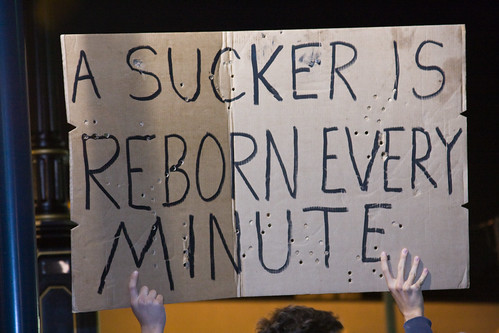Vom armen B. B. -- On the Poor B.B.
German poem by Bertolt Brecht, interleaved with English translation by DocG, and paraphrase by DocG
Ich, Bertolt Brecht, bin aus den schwarzen Waeldern.
Meine Mutter trug mich in die Staedte hinein
Als ich in ihrem Leibe lag. Und die Kaelte der Waelder
Wird in mir bis zu meinem Absterben sein.
I, Bertolt Brecht, am of the dark forests.
My mother bore me from there to the cities
As I lay in her womb. And the cold of the forests
Will be with me to my death.
I, DocG, am of the white river.
My parents once took me to New York City
On a boat. And the winds of that voyage
Will blow through me all my life.
In der Asphaltstadt bin ich daheim. Von allem Anfang
Versehen mit jedem Sterbsakrament:
Mit Zeitungen. Und Tabak. Und Branntwein.
Misstrauisch und faul und zufrieden am End.
In the asphalt city I feel at home. Right from the start
With every last sacrament supplied:
With newspapers. And tobacco. And brandy.
Mistrustful and lazy and, in the end, self-satisfied.
In New York City was I at home. Until the very end
Supplied with every last sacrament:
The Village Voice. And Schimmelpfennig cigars. And Jack Daniels "Sippin" Whiskey.
Cynical and lazy and far too self-confident.
Ich bin zu den Leuten freundlich. Ich setze
Einen steifen Hut auf nach ihrem Brauch.
Ich sage: es sind ganz besonders riechende Tiere
Und ich sage: es macht nichts, ich bin es auch.
I'm a friendly sort. I set
A Bowler on my head as people do.
I say: They’re animals with a very peculiar odor.
And I add: it doesn't matter, I smell too.
I set myself apart from the others. I wear
A floppy hat so I’ll stand out.
I say: people are very very strange
And I ask: isn’t that what it’s all about?
In meine leeren Schaukelstuehle vormittags
Setze ich mir mitunter ein paar Frauen
Und ich betrachte sie sorglos und sage ihnen:
In mir habt ihr einen, auf den koennt ihr nicht bauen.
Mornings, in my empty rocking chairs,
I bring some ladies nigh,
Study them casually and say:
I’m one on whom you can't rely.
Mornings I fantasize about finding a lady
To rock in my all too empty chair.
She’ll study me casually, and say:
Why don’t you come over here?
Gegen abends versammle ich um mich Maenner
Wir reden uns da mit "Gentlemen" an
Sie haben ihre Fuesse auf meinen Tischen
Und sagen: es wird besser mit uns. Und ich frage nicht: wann.
Toward evening I gather some men around me.
We address one another as "Meine Herren."
They place their feet up on my table
And say: our time will come. I don't ask: when.
From time to time I get together with a friend or two.
We address one another as "Monsieur."
They plant their muddy feet on my brand new rug.
One says: I've got a promising interview coming up next week. And I say: Oh, sure.
Gegen Morgen in der grauen Fruehe pissen die Tannen
Und ihr Ungeziefer, die Voegel, faengt an zu schrein.
Um die Stunde trink ich mein Glas in der Stadt aus und schmeisse
Den Tabakstummel weg und schlafe beunruhigt ein.
Toward morning in the grey dawn the fir trees piss
And their vermin, the birds, begin to cheep.
At that hour, in the city, I drain my glass, stub out
My cigar and drift into troubled sleep.
Toward morning in the gray dawn the Hudson River belches
And its victims the fish begin to weep.
At that hour, in the city, I rise to take a piss, then flush
The toilet and return to fitful sleep.
Wir sind gesessen ein leichtes Geschlechte
In Hausern, die fur unzerstoerbare galten
(So haben wir gebaut die langen Gehause des Eilands Manhattan
Und die dunnen Antennen, die das Atlantische Meer unterhalten).
We, a heedless generation, have made ourselves at home
In buildings we thought immune to destruction
(Thus we erected the skyscrapers of Manhattan
And the thin antennae which bemuse the Atlantic Ocean).
My generation has made itself homeless
In mad pursuit of some vague ideal
(Thus we dabbled in drugs and religion,
Trod the thin red line between the real and the unreal).
Von diesen Staedten wird bleiben: der durch sie hindurchging, der Wind!
Froehlich machet das Haus den Esser: er leert es.
Wir wissen, dass wir Vorlaeufige sind
Und nach uns wird kommen: nichts Nennenswertes.
Of these cities will remain: that which passed through them — the Wind!
The house makes the diner merry: he wolfs it down.
We know we’re not here for long
And after us will come: nothing of much renown.
Of our dreams will remain: that which fueled them — hot air!
The balloon will lift slightly, then falter and sag.
We know we’ve been here much too long
And hardly have much cause to brag.
Bei den Erdbeben, die kommen werden, werde ich hoffentlich
Meine Virginia nicht ausgehen lassen durch Bitterkeit
Ich, Bertolt Brecht, in die Asphaltstaedte verschlagen
Aus den schwartzen Waeldern in meiner Mutter in frueher Zeit.
In the earthquakes to come, I hope I won’t
Let bitterness dim my cigar’s red glow
I, Bertolt Brecht, smuggled to the asphalt city
From the dark forests in my mother long ago.
In the disillusionment to come, I hope I won’t
Start smoking again in desperation
I, DocG, sold down the river
To New York City by the older generation.









